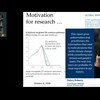wellbeing
Money, peers and parents: Social and economic aspects of inequality in youth wellbeing.
Journal of Youth and Adolescence, 45(7), 1294-1308. Abstract Indicators of social and economic status are important health determinants. However, evidence for the influence of family socioeconomic statu

Mark Budolfson
Mark Budolfson is an Associate Professor in the Department of Philosophy, the Department of Geography and the Environment, and the Population Wellbeing Initiative, University of Texas at Austin. He wo

Petra Kosonen
I am a Postdoctoral Fellow in philosophy at Stockholm University. My research is mostly on ethics and decision theory, and the project I'm currently part of focuses on catastrophic risks. Before coming

Julia Steinberger: Is it possible to live well within planetary limits? Evidence and modelling from the LiLi project
Professor Julia Steinberger researches and teaches in the interdisciplinary areas of Ecological Economics and Industrial Ecology. Her research examines the connections between resource use (energy and
Krister Bykvist: Moral uncertainty
Professor in Practical Philosophy at the Department of Philosophy, Stockholm University and Institute for Futures Studies. ABSTRACT How important is the wellbeing of non-human animals compared to the we
Jan O. Jonsson is a researcher at the Institute for Futures Studies
Jan O. Jonsson is Professor of Sociology at the Institute for Social Research at Stockholm University, and an Official Fellow of Nuffield College, Oxford University. The Swedish Council for Working Li.

How are our young adults doing? A report on labour market activities and living conditions
Research report 2018:3, 114 pages. What are young adults at 19–20 years of age doing? What do their living conditions look like, how do they like their situation and how do they perceive their future? Tworking, youth who are studying, youth who are job-seeking and youth who are doing something completely different. A picture of young adults who are highly active and committed to their labour marketrelated activities and future is revealed. The majority of those in employment enjoy their jobs, and regardless of employment, most young people are optimistic about their future.
Axiological Retributivism and the Desert Neutrality Paradox
Campbell, T. Axiological Retributivism and the Desert Neutrality Paradox. Philosophies 2022, 7, 80. https://doi.org/10.3390/philosophies7040080 Abstract: According to axiological retributivism, people canan outcome in which someone gets what she deserves, even if it is bad for her, can thereby haveintrinsic positive value. A question seldom asked is how axiological retributivism should deal withcomparisons of outcomes that differ with respect to the number and identities of deserving agents.Attempting to answer this question exposes a problem for axiological retributivism that parallels awell-known problem in population axiology introduced by John Broome. The problem for axiologicalretributivism is that it supports the existence of a range of negative wellbeing levels such that if adeserving person comes into existence at any of these levels, the resulting outcome is neither betternor worse with respect to desert. However, the existence of such a range is inconsistent with a setof very plausible axiological claims. I call this the desert neutrality paradox. After introducing theparadox, I consider several possible responses to it. I suggest that one reasonable response, thoughperhaps not the only one, is to reject axiological retributivism.
The Future of Work: Augmentation or Stunting?
Philosophy & Technology 36 Abstract The last decade has seen significant improvements in artificial intelligence (AI) technologies, including robotics, machine vision, speech recognition, and text ge
Raya Muttarak: Population Dynamics under Global Climate Change
Register Abstract Australian bushfire in 2020 and severe floods in Western Europe and exceptional heatwaves in North America in summer 2021, to name a few, are examples of extreme events that are docume








